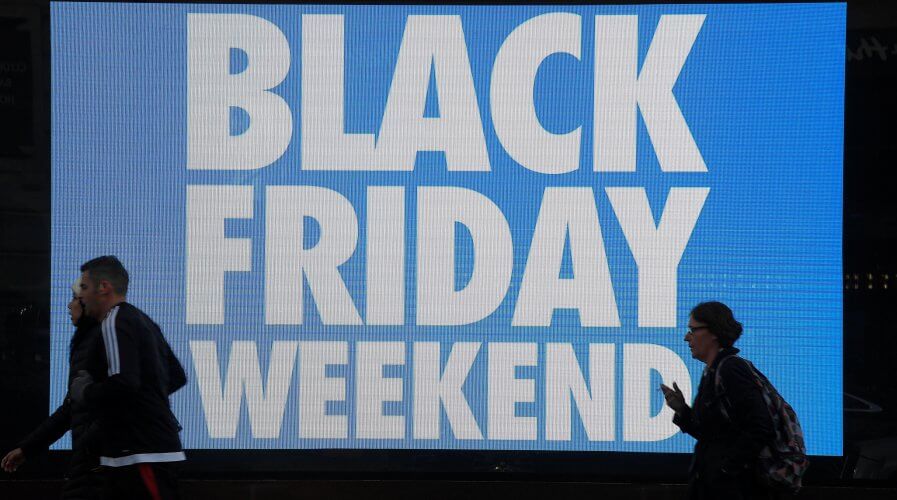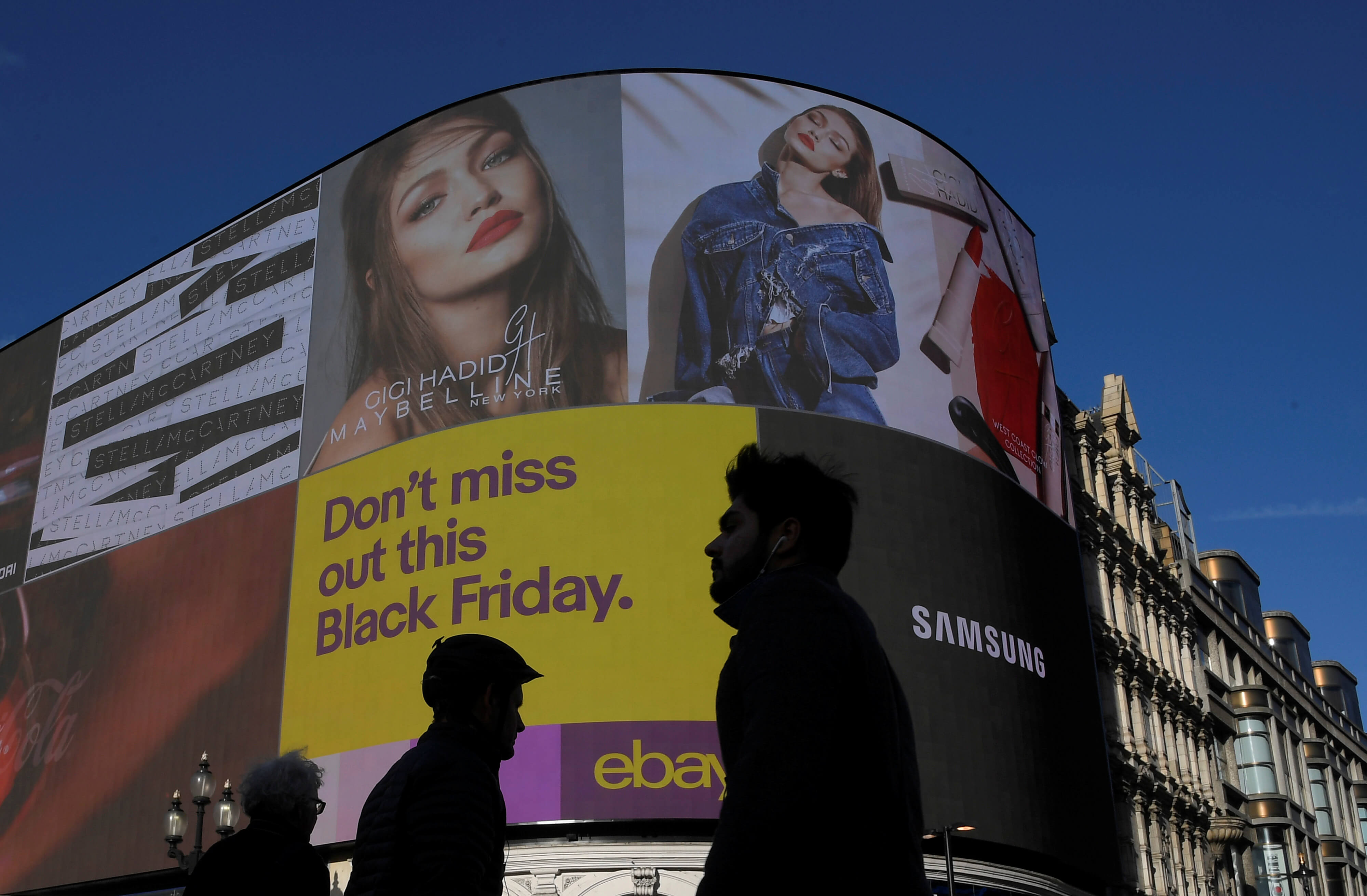
Shoppers are seen walking past an electronic billboard advertising the retail so-called ‘Black Friday’ date and event in London, Britain. Source: Reuters
Fraud cases expected to soar over Black Friday shopping weekend
BLACK FRIDAY may not be able to touch the enormity of this year’s Singles’ Day Sales, but there’s no doubt that the shopping event remains one of the most hotly anticipated dates in retailers’ calendar years. Sales online continue to dominate revenue numbers, with high numbers of shoppers expected to make retailers’ year on the following Cyber Monday sales.
The rise of e-commerce is contributing to a tangential trend, however, that is the increasing rate of online fraud during credit card transactions.
According The Nilson Report, 2015 recorded as much as US$21.64 billion in losses thanks to credit card fraud, marking more than a 20 percent increase compared to 2014. That number is continuing to rise, with 2017 losses forecasted to amount to as much as US$27.69 billion.
The ACI Worldwide Global Consumer Fraud Survey 2016 found that 30 percent of consumers worldwide have experienced some kind of credit card fraud in the last five years. The increase in frequency is largely attributed to “risky behavior” such as poor personal device security and increased digitization of online transactions.
“It’s no surprise that there is a direct correlation between fraud and lower consumer trust and card loyalty, including a primary contributor toward ‘back of wallet’ behavior,” said Ben Knieff, senior research analyst, Aite Group, who authored the 2016 document.

Shoppers reach for retail items on Black Friday at a store in Sao Paulo, Brazil. Source: Reuters
“And as this data illustrates, it’s more critical than ever for financial institutions to implement and actively maintain effective fraud prevention solutions that address fraud, security and customer experience needs.”
Things get even more dicey when you factor in the skyrocketing popularity of the Cyber Monday sales, which are set to overtake Black Friday revenues. A Deloitte report on the sales noted that though many shoppers will want to participate in in-person shopping during Black Friday, the Cyber Monday sales will be well-attended, with as many as 72 percent of respondents saying that they plan on shopping online.
The rise of e-commerce is going to adversely contribute to the levels of card fraud, said an executive from analytics software firm FICO, whichprovides solutions to help financial institutions mitigate cases of fraud and reduce losses
“Black Friday and Cyber Monday will probably see record levels of card fraud this year,” said TJ Horan, vice president, who oversees FICO’s fraud solutions, in a statement.
“If you’re getting ready to start your holiday shopping, you should expect that criminals are out to get your money, and take a few preventative steps. It pays to keep your eyes open at ATMs, to monitor your purchases at least weekly, and to make sure your card issuer has the right contact info for you.”
According to Horan, the rise of e-commerce sales and card-payment options, has boosted instances of card fraud as it widens the pool of potential victims that fraudsters can take advantage of.

Shoppers are seen walking past the electronic billboard at Piccadilly Circus, showing retail adverts incuding one for ‘Black Friday’ in London, Britain. Source: Reuters
“Fraudsters will continue to find vulnerabilities and exploit weaknesses of unsuspecting consumers,” he said to Tech Wire Asia in an email interview.
“Naturally, as more people shop online, they have more targets to victimise – all they have to do is wait for who falls into their traps. For example, they can send consumers emails on Black Friday deals, with click through links that can actually be hoaxes to facilitate information phishing.”
Horan said that while some physical stores in Asia will offer Black Friday promotions, the bulk will come from online platforms. This will boost the occurrence of “card not present” (CNP) payments, which will in turn raise the instances of CNP fraud. CNP fraud is more “likely to occur more than other types of fraud such as ATM fraud,” he said.
Is there something specific about Black Friday and Cyber Monday that makes fraud especially attractive compared to the average day of the week? After all, if card fraud is on the rise it’s hardly right to expect that it will spike specifically on these two days of the year.
Horan draws comparisons to the high level of risk for consumers during the Singles’ Day sales, which blasted all across Asia last week. He says that even with Singles’ Day, Black Friday promotions will likely still be conducted by Asian platforms as part of a continuous roll-out of holiday-related shopping extravaganzas that are looking to set retailers’ books for the rest of the year. Horan said that in Southeast Asia, Google searches for “Black Friday” have surged over the last five years, especially in Singapore, Malaysia and Vietnam.
“It also helps that Black Friday is perfectly timed – just about a month away from Christmas, which is when people start shopping for presents,” he said.

People shop in Macy’s Herald Square during early opening for the Black Friday sales in Manhattan, New York, U.S. Source: Reuters
He said that these shopping events are a commonly used “marketing tactic” that retailers use to promote as “the best day of the year to get the biggest bargains”, a lure that will continue to draw consumers straight into a mad rush of shopping. The huge volume of shoppers logging onto sites and keying in their card numbers is the precise problem when it comes to fraud, as it places a huge burden on credit card companies, while opening up the flood gates for fraudsters.
“With the high volume of transactions as shoppers hope to clinch the best deals and cost savings, credit card companies may struggle to keep pace in monitoring fraudulent transactions if they don’t have proper fraud blocking strategies in place.”
On the topic of marketing tactics, many retailers have taken to offering multiple avenues for consumers to access the sale. Black Friday and Cyber Monday contests and lucky draws are a popular strategy, and it’s primed for hackers to attack because these games usually require participants to willingly fill in forms with sensitive information, ranging from phone numbers to addresses and identification numbers.
“If third parties can lure consumers into submitting these pieces of information, there’s a risk of using such information for phishing purposes,” he said.
“There have also been fraudulent Black Friday apps that masquerade well-known brands to spread malware, steal customer credentials and phish for sensitive data.
“Cybercriminals may also modify and use variations of a known company’s Internet address to lure consumers into visiting these imitated sites, where they key in their card details in exchange for “goods” they wish to purchase.”
READ MORE
- Strategies for Democratizing GenAI
- The criticality of endpoint management in cybersecurity and operations
- Ethical AI: The renewed importance of safeguarding data and customer privacy in Generative AI applications
- How Japan balances AI-driven opportunities with cybersecurity needs
- Deploying SASE: Benchmarking your approach








